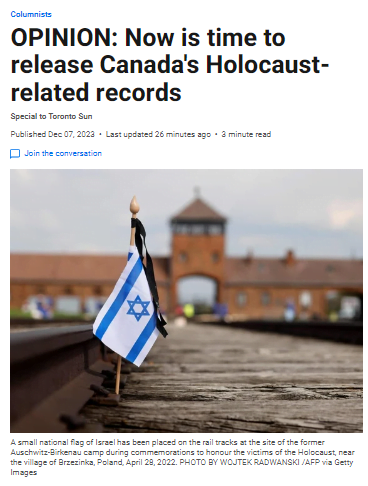Toronto Sun
December 7, 2023
OPINION: Now is time to release Canada’s Holocaust-related records | Toronto Sun

And then the twist: it turned out that Hunka once served as a member of the 14th Waffen SS Galicia, a Nazi unit during the Second World War.
While that day will be remembered by Canadians as the day that our country honoured an individual who fought for the wrong team during the Second World War, it can also be remembered as the day when Canadians started to learn about Canada’s sordid and secret past.
During this dark period in Canada’s history, the Federal Government welcomed thousands of Nazis and their collaborators to our country. They were welcomed with open arms while many Jews from Eastern Europe were denied entry into Canada.
As we approach International Holocaust Remembrance Day on Jan. 27, 2024 – the anniversary of the liberation of Auschwitz-Birkenau – the Trudeau-led government has a golden opportunity to release its Holocaust-related records. These records include a written policy report by Alti Rodal, entitled Nazi War Criminals in Canada: The Historical and Policy Setting from the 1940s to the Present, and Part II of the Deschênes Commission report, which was issued in 1986 and addressed individual cases of Nazi war criminals and collaborators. They have never been made public.
In addition, the Government has in its possession hundreds of Nazi war-crimes files originally held by the Department of Justice and Royal Canadian Mounted Police – records that are all inaccessible.
As a member of the International Holocaust Remembrance Alliance (IHRA), Ottawa has the duty to fulfill a key commitment by IHRA’s Stockholm Declaration, which commits all signatories, including Canada, to: “Take all necessary steps to facilitate the opening of archives in order to ensure that all documents bearing on the Holocaust are available to researchers.”
While B’nai Brith Canada has yet to receive any kind of official confirmation that the Government will release the records, there is reason to be hopeful.
Since Sept. 22, 2023, B’nai Brith has had a slew of meetings with parliamentarians and senior ministerial officials about federal recommendations that were initially conveyed to government and opposition parties via a February 2023 written submission to a House of Commons Access to Information, Privacy and Ethics Committee for its recent study on Canada’s Access to Information system.
B’nai Brith was delighted to see a forward-thinking recommendation in a June, 2023 report entitled “The State of Canada’s Access to Information System.” The Committee called on the Government of Canada to “implement a process for the automatic release of historical documents that are no more than 25 years old.” Canada’s Holocaust-related records would be the perfect selection of records to be released as they are within the possession of the Government.
During these meetings, B’nai Brith also has raised a recommendation that is found in its Aug., 2023 pre-budget submission. It calls on the Government to “dedicate funding to create a publicly accessible digital archive of all records (government departments and agencies) relating to the Holocaust and then have Library Archives Canada (LAC) organize and release them as non-redacted copies readily open and accessible to the public.”
The creation of a publicly accessible digital archive of Holocaust records would be one way to circumvent the broken Access to Information system that exists in Canada. To date, multiple attempts have been made by members of B’nai Brith’s Matas Law Society to obtain records about Nazi war criminals in Canada. These efforts have not born fruitful results.
In a recent piece in the New York Times headlined, “Nazis in Canada? A Secret List With Answers May Soon Be Released,” David Matas, Senior Legal Counsel for B’nai Brith Canada, wrote “We can learn from the failures of the past to avoid the repetition. But we cannot avoid the repetition until we know the past – and we can’t know the past until we get the record.”
Honouring Hunka further makes clear why now is the time to release Canada’s Holocaust-related records.
Michael Mostyn is the CEO of B’nai Brith Canada. David Granovsky is the Director of Government Relations for B’nai Brith Canada.


